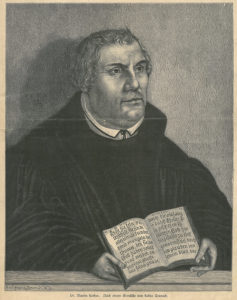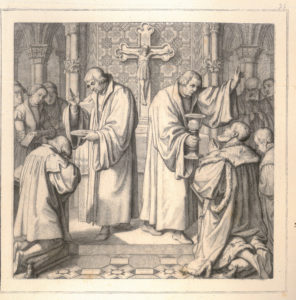by Rev. Anthony Dodgers

In his eight Invocavit sermons, Martin Luther taught his congregation how they should first hear God’s Word and think of their actions in light of that Word. But he also taught them how they should think of their neighbor and what they should do to care for their fellow Christians. Luther makes the careful distinction between faith and love, or what is a “must” and what is “free.”
In his first sermon, Luther explained this important distinction that all Christians should make:
Take note of these two things, “must” and “free.” The “must” is that which necessity requires, and which must ever be unyielding; as, for instance, the faith, which I shall never permit any one to take away from me, but must always keep in my heart and freely confess before every one. But “free” is that in which I have choice, and may use or not, yet in such a way that it profit my brother and not me. Now do not make a “must” out of what is “free,” as you have done, so that you may not be called to account for those who were led astray by your loveless exercise of liberty. For if you entice any one to eat meat on Friday, and he is troubled about it on his deathbed, and thinks, Woe is me, for I have eaten meat and I am lost! God will call you to account for that soul (AE 51, 74).
So, things pertaining to the faith are “musts.” For example, the Sacrament of the Altar must not be presented as a sacrifice for that would rob glory from the sacrifice of Christ and destroy the free gift of forgiveness offered there. On the other hand, fasting, or abstaining from meat on holy days, is a custom that is neither commanded nor forbidden by God and so it is a “free” thing. Now if a person views their fasting as a good work by which they merit God’s favor, then they have turned a “free” thing into a “must,” and so have destroyed the Gospel. But when the Wittenbergers did away with fasting and forced people to eat meat, then they also turned a “free” thing into a “must.” Furthermore, by not teaching the Gospel which gives freedom, they led their weaker brothers into sin. For even though it is not a sin to eat meat, “whoever has doubts is condemned if he eats, because the eating is not from faith. For whatever does not proceed from faith is sin” (Romans 14:23). This is why it is not enough to do the right thing, but a Christian must also have a good conscience while doing it.
Love for the neighbor and patience with the weaker brother are themes that come up frequently in these eight sermons. Luther wants to see the church reformed, but he takes Wittenberg to task for the manner in which they tried to achieve these reforms. They forced matters through without patient teaching and waiting for God to give the good results. Luther unmasked their earnest piety as a loveless misuse of Christian freedom. Not only had they placed themselves in danger by not carefully considering God’s Word, but they had also sinned against their neighbor by refusing to show love to those in need. The most deeply cutting of Luther’s eight sermons is the seventh. He says:

We shall now speak of the fruit of [the Sacrament of the Altar], which is love; that is, we should treat our neighbor as God has treated us… But this I do not yet perceive among you here in Wittenberg, even though you have had much preaching and, after all, you ought to have carried this out in practice. This is the chief thing, which is the only business of a Christian man. But nobody wants to be in this, though you want to practice all sorts of unnecessary things, which are of no account. If you do not want to show yourselves Christians by your love, then leave the other things undone, too… You are willing to take all of God’s goods in the sacrament, but you are not willing to pour them out again in love (AE 51, 95–96).
It seems that the teachers and hearers of Wittenberg had seized upon Luther’s great Gospel insight from The Freedom of the Christian: “A Christian is a perfectly free lord of all, subject to none” (AE 31, 344). What Luther meant by that statement is that faith toward God in Christ receives the Gospel which liberates the Christian from the tyranny of sin, death, and the devil. This does not mean the Christian is liberated from his neighbor, from his vocation, or from the will of God as it is expressed in His commandments. In short, the Christian is not liberated from love, but liberated to love. Clearly, the Wittenbergers had utterly failed to take to heart Luther’s second insight in The Freedom of the Christian: “A Christian is a perfectly dutiful servant of all, subject to all” (AE 31, 344).
Luther’s emphasis on heeding the call to love and patience is insistent in these sermons. It even impacts that essential distinction between the “musts” and the “free.” Luther can see that even in the things which are “musts” and are matters of necessity, such as believing in Christ, love nevertheless never uses force or undue constraint. Thus the mass is an evil thing, and God is displeased with it, because it is performed as if it were a sacrifice and work of merit. Therefore it must be abolished… Yet Christian love should not employ harshness here nor force the matter. However, it should be preached and taught with tongue and pen (AE 51, 75).
While Luther counsels love and patience, it is not a “live and let live” solution. Instead, love goes hand in hand with the pure preaching of God’s Word. External force should not be used, for it cannot change the heart. But the Spirit will be active in the heart when the Word is heard and understood. Then God’s goods of forgiveness, life, and salvation, given to the Christian for his own benefit, can also be poured out again in love for the benefit of his neighbor.
The Rev. Anthony Dodgers is pastor of Immanuel Lutheran Church, Charlotte, Iowa.